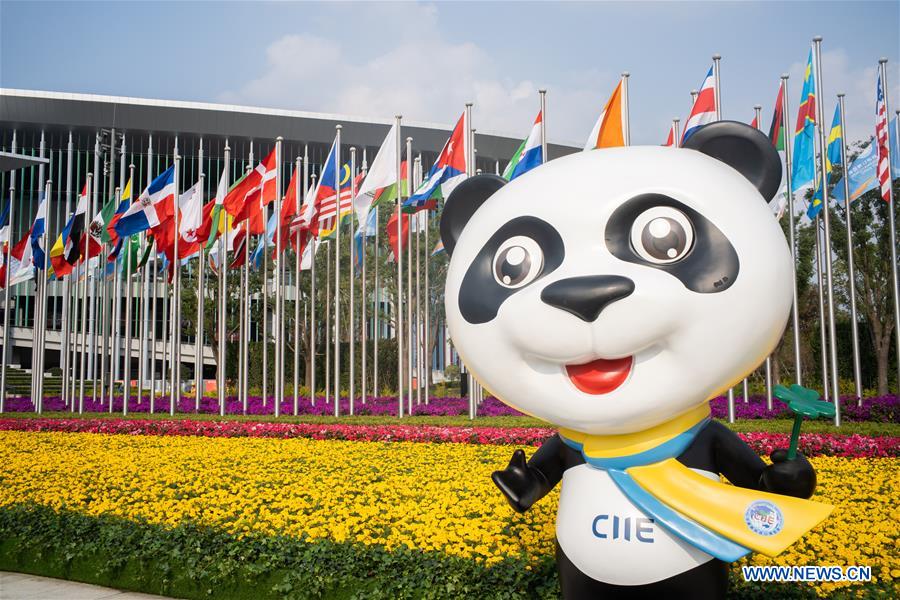CIIE to expand China's influence in global economy
By Peng Bo | chinadaily.com.cn | Updated: 2019-11-08 14:50

In his speech at the opening ceremony of the second China International Import Expo, President Xi Jinping reaffirmed that China's door will be opening wider, China will stick to the new development idea and that China will bring more new opportunities for world economic growth.
Facing new situations, the second CIIE demonstrates China's confidence in further expanding opening-up.
Sino-US trade fictions have become tenser since 2018, which brings uncertainty to China's development prospects. But despite continuous trade frictions, a majority of Chinese people are confident in China's future.
China can bear the losses caused by trade frictions, and China's government and enterprises strive for improving themselves through self-enhancement and innovation. A series of reforms gradually take effect, the business climate continuously improves and administrative efficiency is persistently optimized. The global ranking of China's business environment increased from 78 in 2017 to 31 in 2019.
Despite the US government not sending any senior representatives to attend the second CIIE, many US enterprises participated in the event, which draws wide public concern. There were 192 US enterprises, including leading global enterprises such as Microsoft, Boeing and Qualcomm, participating in the second CIIE, which marked an 18 percent increase in attendance than the first CIIE. And the US ranks first among all the attending countries in terms of exhibition hall areas. All these show that US enterprises are optimistic about China's economic prospects and market potential and would love to continue their investment in China and cooperate with Chinese enterprises. Under the circumstances that trade frictions seriously undermine Sino-American economic and trade relations, as well as the interests of US enterprises, these US enterprises' enthusiasm in the second CIIE is of great significance.
The second CIIE not only demonstrates China's determination in further promoting reform and opening-up, as well as supporting free trade, but also aims to expand China's influence in the global economy.
The second CIIE has greater influence and on a larger scale than the first. The exhibition zone area has expanded from 300,000 square meters to 330,000 square meters, and guest countries promoting their culture have increased from 12 to 15. More than 250 Fortune top 500 and industrial leading enterprises attended the second CIIE, which has increased from about 220 last year.
China's central departments and local authorities established 39 trade groups and about 600 trade sub-groups, which provide an effective guarantee to trade activities at the CIIE. The second CIIE also has an increase in several new high technology demonstration zones, including artificial intelligence, to enrich the exhibition.
Nowadays economic globalization and collaboration of the global value chain are directly related to the interests of people from all over the world. During the crucial historic moment that a new round of technological revaluation and industrial revolution are about to make great breakthroughs, economic integration is an irresistible trend globally. Reverse globalization can hardly find a way out, and trade protectionism, as well as unilateralism, undermines the interests of all the parties involved. Only wider opening up and cooperation can promote revolution and development.
In a climate of trade friction and global economic downturn, China started and continuously holds CIIE, which shows China's resolution in sticking to a multilateral trade system and promoting trade, investment liberalization and facilitation, as well as actively seeking inclusive and mutual beneficial development.
To promote economic globalization development and head for more open, inclusive, balanced and win-win direction, China voluntarily reduces tariffs and institutional costs and expands imports of high quality products and services from foreign countries. China enhances the fundamental role of domestic consumption in economic development, which will not only provide support to China's economic development, but also expand space for global economic growth.
China is willing to sign a high standard, free trade agreement with more countries, and accelerate bilateral and multilateral trade agreement negotiation to jointly push forward the development of economic globalization.
The author is a researcher at the Chinese Academy of International Trade and Economic Cooperation.























